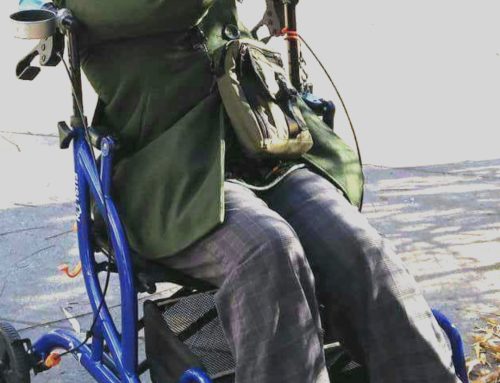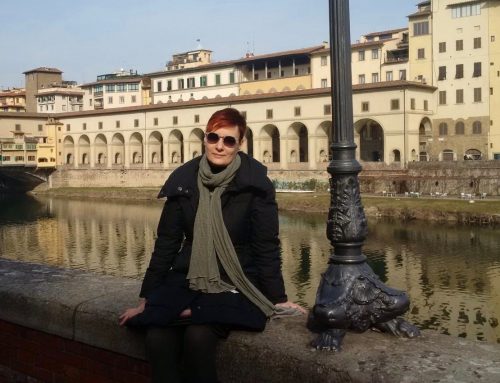by Karin Aurino
I have this perfect life—a perfect husband, three happy children, a beautiful home in the City of Angels—even the neighbours are nice. So why am I hiding in my bedroom? Because everything that was good, has somehow turned bad. So I’ll stay upstairs. Problem solved.
Downstairs, my husband will be drinking a glass of wine while making dinner. It’s his turn to cook and he’ll be half into that bottle already. He’ll pour me a glass of red like he does every night. Fine wine—one of the first things we invested in when we started making our mark on the world.
It’s not a problem, but I stopped drinking today. Well, it’s early, so we’ll see. I’m not an alcoholic, but something happened recently, maybe a month ago. Something not so perfect. I don’t talk about it.
Still stranded in my bedroom, the ocean is five miles away, and there is a salty breeze off the second-floor balcony. It’s glorious. If I go downstairs, I’ll see it there on the marble island in the middle of our French country kitchen, frothy bubbles resting on the freshly poured glass of cabernet with its rich, woody aroma. I’ll pick it up as I have each night for the last ten years and take a sip.
I don’t want to take a sip. I want to take a break from all the sips. And there are reasons. I want to sleep at night. I want my headaches to go away. I don’t want to be short-tempered. I don’t want to worry about getting in my car and driving and getting pulled over and not passing the sobriety test and going to jail and waiting for my husband to post bail, even though I am only mildly muddled—not drunk. Not drunk because I have a high tolerance, something I used to be proud of.
I don’t want my children to get the wrong impression of their mother. Or maybe the right one. I go downstairs.
Day One: Pounding Headache
Day one is a Monday. It’s hard. You would think that it wouldn’t be because I’m hung over. But everyone knows about hair of the dog. It bit me hard, punctuating another blemish on my liver. And now I need that drink to take the edge off. At least that’s what I’ve programmed myself to believe.
There are so many things that are wrong with Monday. People who commit suicide almost always do it on Monday. Evil Monday. Nine to fivers must go back to work. Students must return to school. Parents must drive their children to school, to sports, to activities, to play dates, make their breakfast, help them get dressed, and remind them to brush their teeth. Responsible things happen on a Monday, and you are accountable for them. I am accountable for them. So I begin my day making sack lunches by smearing organic peanut butter on a two-pound piece of twelve-grain bread and placing it in a clear, recyclable container until my eight-year-old son trots into the kitchen and reminds me the school is nut free.
Day Two: Shaky and Weary
At night I begin reading to my youngest daughter her favourite children’s book while we are curled up in her little bed where a painted mural filled with rainbows and fairies and unicorns hovers above us. We are body to body, snuggling together.
“If you give a pig a pancake, she’ll want some syrup to go with it.”
My thoughts take me to that place of sin. If you give a drunk a drink, she’ll want another to go with it.
She says between tinkling giggles, “Keep going, Mommy.” I have read it to each of my three children over a hundred times. My fingers are shaking ever so slightly as I try to turn the page.
Has my daughter noticed? I ask her to turn the pages for me, and I go on, “She’ll probably get all sticky, so she’ll want to take a bath.”
She’ll probably get all sloppy, so she’ll want to take a nap.
Day Three: Sweaty and Contentious
I love my children dearly, but I have lost myself and my life to theirs, favouring the helicopter-parenting approach. I have lost my freedom, chained to their every need or desire placed well ahead of my own, my career in publicity a distant memory in favour of becoming a stay-at-home mom. After years with babies and toddlers, my communication skills have dwindled to one and two-syllable words.
While at a cocktail party on the pristine lawn of a school parent’s majestic home on the Bluff overlooking the Pacific, a woman in a tailored business suit asks me what I do for a living. My answer is, “I take care of my children.” Her response, “Oh.” An awkward pause is followed by a hint of condescension, “The noblest of professions. Our children need more like you.”
She moves on because she is afraid I will have nothing to contribute to an adult conversation, as though I don’t read or watch the news or understand what it means to have a job. So I struggle. I struggle because I don’t have a reason for the amount I drink or how often I drink. There is no reason.
I have a good life.
I have a great life.
I have an almost perfect life.
Yet each day I struggle. I struggle because picking up a glass of wine with dinner is a habit, like checking your cell each morning when you wake up. It’s part of the routine. Yet my habit had extended into the afternoon when I came home from picking up the kids. I would pour a glass of sauvignon blanc, convincing myself it was like an afternoon in Martha’s Vineyard—a happy time, a youthful time—and it would take me to a better place, take the edge off.
It did take the edge off, except I’ve never been to Martha’s Vineyard.
Day Six: Exhausted and Sore
Day six is a Saturday, and I’ve convinced my neighbour to take my kids for a play date at their house so that I have a quiet break. My husband’s friend Ted, who remains single and childless and hides a gut that hangs over khaki pants with a pink polo, stops by to show us his weed. In the kitchen, huddled around the cold marble island, he says, “The latest method of transport for inhaling weed is genius. There’s no down side now. Because the toxins have been removed and there’s some sort of filtration system, the benefit for patients with medical needs is all good.”
I’m wondering what his medical needs are. Ted proceeds with a demonstration by igniting the grassy marijuana in the tube. I lean in and take a big sniff.
My husband is leading-man handsome with hazel-green eyes and shiny hair as dark as the black crayon. He is an entertainment lawyer at a top firm and is known as their master debater. At home he lives in blue jeans and $50 t-shirts. He looks over at me, “What are you doing?”
It’s glorious, my eyes glassy from remembering. “Give me a break, I’ve been sober for six days. It’s not like I took a hit off a joint or anything. Tell him, Ted. It’s all good.”
My husband sits back like a black-robed judge and hands down his sentence, “It’s exactly like taking a hit off a joint. It’s not good. Pot is the gateway drug.”
Ted says, “Dude, nobody calls it pot anymore.”
“Well, nobody says dude anymore.”
“Yes they do.” Ted smoothes his sandy blond hair with a perfectly manicured hand.
“I have all kinds of drugs upstairs in my medicine cabinet,” I say to my husband, “and you don’t see me taking those, do you?”
“Really?” Ted asks. “Like, what kind of drugs?”
“Those are expired prescription drugs,” my husband says, “from when you gave birth three years ago.”
“No they’re not. That’s a sell-by date. And I can start taking some of that Vicodin right now if I wanted to, but I don’t.” I make a face. “I don’t want to get addicted.”
“Hey, uh, I could probably take those off your hands,” Ted offers. “I mean, you know, if you’re not taking them and all.” He looks at my husband, “Dude.”
Day Ten: Still Obsessing
It wouldn’t be so bad, but I just had lunch with my closest friend for her birthday. Her other friend Cameron, who reminds me of Peppermint Patty with her auburn hair and freckles and tomboy attitude, joined us at Ivy at the Shore. She ordered a glass of white wine while we sat on the floral-cushioned, wicker chairs and forgot to notice the ocean. It was called Honeydew or Honeybee or something that started with Honey. She kept talking about it because she had liked the name of it, though none of us could remember what it was. I began staring at it, its colour deep and rich, the colour of honey. It was silky and smooooth. I could feeeel it in my mouth because I know the taste of a fine white so well. It was as if I was having that glass of wine, but I wasn’t. Peppermint Patty was bubbly when she said, “It’s so delicious; you have to try it.”
I didn’t try it, but my best friend did. She’s a former swimsuit model who still has that amazing just-off-the-beach look—tan, long blonde hair, blue eyes. Perfect. And then she ordered a glass for herself. “Get one with me,” she said. “We’re celebrating.”
“I have to pick up the kids!” It came out loud and harsh, unexpected. The thought of getting behind the wheel again after a few rounds lingered in my head, over and over, especially after what happened. But I don’t talk about it.
“Me too. Are you okay?”
Not wanting to draw attention to not drinking only made it worse. I didn’t want to talk about it with my best friend who I’ve been drinking with for a dozen years, longer than we’ve known our husbands. How could I put a dent in us or ruin our fun foursome. “I think I’m getting another migraine, so I’d better not.”
She made a sad face, “Poor honey.”
I felt left out. Would one little sip really matter? One little glass? Now I can’t get that yummy smell of honey-something out of my head.
Day Twelve: Sanctimonious and Absurd
A Friday. A dozen days of detox. On the twelfth day of sobriety my true love gave to me . . . a night with the kids while he goes out drinking with his golf buddies. I’m glad he is off having a good time with his friends. He rarely does, and it gives me a little peace after the kids go to bed. I can read. I can write. I can sleep.
I can have my twelfth glass of water.
I was telling my husband this morning before he went to work that I cannot in good faith call myself an alcoholic. “I’m just taking a break so I can sleep better and drop a couple pounds.” I said this partly because he does not see me as an alcoholic. He can’t. I won’t let him; if he does, then I will be a different person to him. I will be defined by it. So much of our past will be different. It will be seen through the eyes of a person who did something wrong all those years, because each memory has a drink attached to it. All of those beautiful memories that we have together will be associated with a flaw, or worse, a disease. Isn’t that what it’s called?
In the master bath he straightened his tie and pecked me on the cheek, “Definitely. It’s good to take breaks. And you have been sleeping better.” He smiled, “Less snoring.” Then he patted my ass on the way out. It only jiggled a little, so I ignored the giant scale poking out from under some dirty laundry spilled out from the basket.
I don’t want to be a person with a disease.
Since I am in charge of whether or not I claim to be an alcoholic (just answer “no” to all the leading questions on the AA brochure), I choose not to be. Therefore, I do not have a disease.
Telling my husband that I am not an alcoholic saves him from considering whether he is one too. He drinks more than I did. But we can both stop at any time. I did. I stopped twelve days ago. I tell myself it is easy to stop. I do it all the time. I say I am not an alcoholic because the words “I don’t drink” don’t sit well on my tongue. It isn’t natural. I can always go back knowing that I can always stop. I can stop knowing that I can always go back.
I can always stop if I need a good night’s sleep or unblemished speech or full faculties or stress-free driving. I can always stop. But we have a large collection of wines in our cellar and in our rented locker on Pontius Way off Sepulveda. Excuse number one: wine is an investment. Excuse number two: wine collecting is prestigious. Excuse number three: it tastes good. What can I do? Let my husband drink it all?
No way.
I can start any time because I can stop any time. It’s not like fried foods. We force ourselves to develop a taste for fat. Stop eating all fried foods for two weeks. It’s hard to do. I know because I did it. The cravings are unbearable, the way your eyes will light up when a plate of fries walks by your table at a restaurant, the smell wafting into your nose. Your mouth will salivate like Pavlov’s dog. But once you rid your system of fried foods, I promise you the next time you reach for that chicken nugget it will taste disgusting. You will have to train your body all over again to enjoy that nasty, greasy, artery-clogging fat.
Wine isn’t like that. Once you train your palate to appreciate a perfect, 100-point wine it will stay with you for life. It’s true that you will have ruined yourself for the cheap wines. You cannot go back to Trader Joe’s two-buck chuck because it will taste so bad that it will cause a gag reflex.
When I sip from a glass of 1986 Châtaeu Lafite Rothschild, it feels like a slice of heaven has descended onto my tongue and elevated my spirit to a place unknown to humankind. That will never go away, like a good childhood memory that leaves a lasting impression. And I dream about it. I relive it.
Day 13: Saturday
I ordered sparkling water. The restaurant, famous for its Kobe steak and red-padded booths, was crowded and noisy. The server dressed in black vest and tie brought the bottle to our table for my husband to approve. He pulled his wine opener from his pocket and pierced the cork. The silver screw made a delicate squeaking noise as it descended, audible only to our table’s ears. The cork made a perfect popping sound when released from the bottle. The slightest billow of smoky vapour loomed above its throat. A slender amount of the rich red was carefully poured into my husband’s glass. He swirled it round and round, then moved it to his nose. My mouth watered while I imagined enjoying the aroma as he did. My lips parted as he placed it to his lips and took a gentle sip. He swished it around on his tongue, and I moved my jaw with his. My husband nodded his approval, and the wine was poured into my glass before I could reach my hand out in protest.
I stared at it. I reached for it like an old lover who you forgot had left you and didn’t want you anymore. I thought I would swirl it round and simply inhale its vibrant splendor and be done with it. But alas, the next step after the sniff was a natural progression onto my tongue. So I took a long, loving sip.
Instantly my senses came alive. My eyes brightened, my sinuses cleared, my ears tingled, and my taste buds exploded. My entire body relaxed deep into that slippery, leather seat. My soul rose high above me, floating graciously over our table. My husband proposed a toast, oblivious to my failure. As my eyes glazed over, the rest of the glass went down easy, and suddenly life was perfect again.
And that was it.
The ritual of enjoying a bottle of wine is sensuous, and the taste is as seductive as the desire to drink it. It’s second nature, like driving a car—you get in and turn the key. The next thing you know, you’re gliding along in traffic, or you’re easing the liquid down your throat. It’s second nature, until the officer pulls you over and shines a flashlight in your eyes and asks you for your license and registration and makes you get out of the car and you stumble on a slope and he tilts his head. And then he takes all the fun away. I don’t like to talk about it.
It wasn’t worth it—that glass of red—or was it? It didn’t taste good. Yes, the taste was good, but the taste of failure left on my tongue was bad. The bad taste of breaking sobriety yet again will linger longer than the succulent, oaky flavour of the cabernet. Heads turned in the restaurant when I fought with my husband, and it was ugly. We fought over nothing I remember—the accumulation of little irritations. I had wanted him to stop me, but he had no way of knowing this. I blamed him, yet it wasn’t his fault. Later, that glass of wine made me angry and then sad. The only thing left are tears. I have failed. Again.
Now I have to start all over again.
Day 13. Saturday. Stupid Saturday. Unlucky 13.
The twin bed creaks beneath my weight. Holding onto her tightly, I read to my perfect little girl, “Feeling sticky will remind her of your favourite maple syrup. She’ll probably ask you for some.” She giggles, knowing what’s next, “And chances are, if she asks you for some syrup, she’ll want a pancake to go with it.”
I look into her innocent eyes and know that one day my children will be old enough to understand.
Feeling flawed will remind her of her favourite glass of wine. She’ll probably ask you for some. And chances are, if she asks you for some wine, she’ll want the whole bottle to go with it.
I tuck her in and kiss her goodnight. The room is dark except for the flashing red light. It is always followed by the sound of the officer’s footsteps echoing on the pavement. I feel another migraine sprouting when he shines the blinding light in my eyes. The tube I blew into was faulty so it was easy for the lawyer, my husband’s friend, to make it all go away. But it didn’t go away. It haunts me, and I need to talk about it.
Day One: Sunday. Clarity and Hope
I walk into the master bath and close the door behind me. My husband is naked. He has just turned on the shower. I embrace him, locking my fingers around his waist, and rest my cheek against his chest. He holds onto me, and I understand my life doesn’t need to be perfect. Maybe it shouldn’t be.
“I need your help,” I whisper.
August 2017

 Karin Aurino is an American writer of essays, short fiction, and a first novel, which draws on an early career as a fashion model. She is a former Longform and Series Television Producer with Alexander/Enright. She started her entertainment industry career in the talent department at ICM. Karin is the recipient of residencies at Hedgebrook and Bread Loaf. Her fiction has appeared in r.kv.r.y. quarterly literary journal and has received recognition from Glimmer Train. She is a member of The Woolf Pack, founded by the Humanitas Prize Foundation—empowering and nurturing writers. Karin lives in Los Angeles with her husband, two children, and their dog, George.
Karin Aurino is an American writer of essays, short fiction, and a first novel, which draws on an early career as a fashion model. She is a former Longform and Series Television Producer with Alexander/Enright. She started her entertainment industry career in the talent department at ICM. Karin is the recipient of residencies at Hedgebrook and Bread Loaf. Her fiction has appeared in r.kv.r.y. quarterly literary journal and has received recognition from Glimmer Train. She is a member of The Woolf Pack, founded by the Humanitas Prize Foundation—empowering and nurturing writers. Karin lives in Los Angeles with her husband, two children, and their dog, George.




